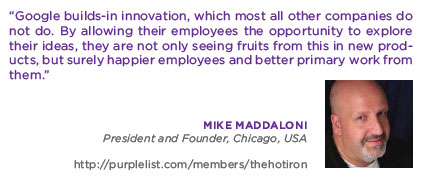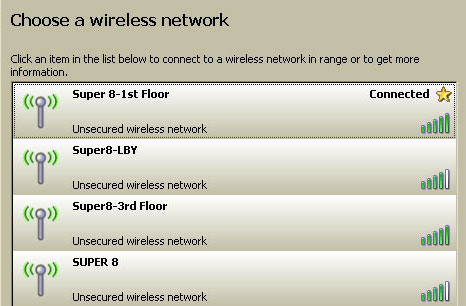Next likemind Chicago on Friday May 21
 The next likemind will be Friday, May 21, 2010 in dozens of cities around the world.
The next likemind will be Friday, May 21, 2010 in dozens of cities around the world.
In Chicago, it will be at Argo Tea, 140 S Dearborn St. at the corner of Adams and Dearborn Streets in the Loop from 8:00 am to 10:00 am.
I call likemind a gathering of creative-minded people, from various disciplines including Internet, advertising, art, social media, et. al. For more information on likemind, you can read this great article on likemind from the New York Times.
No RSVP is required. You are also welcome to join the likemind Chicago Facebook group.
Did you enjoy reading this? You are welcome to subscribe to The Hot Iron by RSS feed or by email.
Mike Maddaloni Is Featured In The PSFK 2010 Good Brands Report
Trends research, innovation, and activation firm PSFK has just released their 2010 Good Brands Report. This is a study on 10 top global brands, their reason for inclusion and opinion on each from a panel of experts.
The Good Brands for 2010 are: Google, Apple, Jamie Oliver, MIT, Ace Hotel, IKEA, Nike, Twitter, Foursquare and Nintendo.
The opinions on each brand come from members of the Purple List, of which I, Mike Maddaloni, am a member. The Purple List is described as “a network of experts for hire. The list is comprised of designers, journalists, marketers, and entrepreneurs.” My quote for Google on page 5 of the report is as follows.

It Reads, “Google builds-in innovation, which most all other companies do not do. By allowing their employees the opportunity to explore their ideas, they are not only seeing fruits from this in new products, but surely happier employees and better primary work from them.”
You can get a copy of the 2010 Good Brands report here, or read the SlideShare report embedded below.
I appreciate the opportunity once again to be part of such a high-profile report, as I was quoted last year on Virgin.
Did you enjoy reading this? You are welcome to subscribe to The Hot Iron by RSS feed or by email.
My Takeaways From The Book Common Sense
As much as I strive to not talk straight politics here at The Hot Iron, it comes up. In this case, I recently read the book Common Sense by Glenn Beck.
If you are still reading this after the last sentence, thank you! I know some have strong positive or negative opinions of Beck, however I am writing this as I do about all books I read, penning my takeaways from it, which I received the book as a gift from a family member.
My greatest takeaway from the book was not from Beck's writings at all, rather from its appendix which had the full text of Thomas Paine's Common Sense, written in 1776. With this, Beck reinforces his points with the complete writings of the original pamphlet. Many authors I have read use numerous quotes to make their point, but not an entire piece. Granted it was probably easier as Paine's writings are in the public domain. But if you can, why not? It made it easier to read one set of points, then another.
Another takeaway from the book was to publish what you say. i am not a regular viewer of Beck's Fox News show, but I have watched it. What I read was in line with what he says on his show.
My final takeaway from Common Sense is to be a well-informed member of society. And I'll leave it at that!
Common Sense was a quick read and I recommend it to anyone who enjoys political discussions or watches the author's show.
Did you enjoy reading this? You are welcome to subscribe to The Hot Iron by RSS feed or by email.
My Takeaways From The Book Unleashing The Ideavirus By Seth Godin
Are all ideas timeless? This question came to mind recently as I started reading Unleashing the Ideavirus by Seth Godin, a book which was released about a decade ago. I was aware of the book and I have read others of Godin’s books like Purple Cow and Meatball Sundae and found those books interesting and energetic, but what about a business and marketing book written just as all the dot-coms were failing?
As I thought about this, I kept my thoughts focused to what I do here at The Hot Iron, writing my takeaways from the book rather than an in-depth review of it. Keeping true to my theme, here are my takeaways from Ideavirus.
My greatest takeaway is on the way things have been done before – you most certainly can try to do it as before, and it may work or it may not. Display billboards may work in Oshkosh, Wisconsin, but not necessarily in Chicago. But in Chicago there is the desire by the new owners of the Cubs to have a Toyota billboard in the outfield of Wrigley Field. Is this the best way to spend money by Toyota? From the Cubs perspective it is, as it is new money, and they only have to look to Fenway Park of an example of this. Billboards won’t be going away anytime soon, but they may start to fade more where they are not as effective.
Another takeaway is on the use of hyperlinks within the book, and if you lose anything in the telling of the story when the links are no longer valid. Throughout the book there’s mention to companies who are no longer in business. There’s also links to those companies, as well as other URL links, which are no longer valid. With a move more and more to eBooks and the pervasiveness of the URL, how should this handled in telling a story? Does the story lose something when a link is broken? Or should there be a hybrid, where the link is present, but also in the story/book is a detailed mention of the Web site or page linked to and more written within its pages about the company or entity? In my opinion noting is lost with the broken links, but nothing gained from them either.
Unleashing the Ideavirus is a quick and energetic read, and you can read it for free in many formats. A PDF is still available here on Seth Godin’s Web site, as it was originally released for free. You can also read it in pieces from DailyLit, as I did. It is also available for sale, and clicking on this affiliate link to Amazon.com will allow you to buy Unleashing the Ideavirus. And even though almost 10 years own, I feel Ideavirus is relevant today, probably moreso with the proliferation of social media, which did not exist then as it does today.
Did you enjoy reading this? You are welcome to subscribe to The Hot Iron by RSS feed or by email.
Super WiFi Value from Super 8 Motels
On a recent trip my family stayed at a Super 8 motel. It was everything we wanted – close to where we were visiting, clean, comfortable and at a great price. But above all, for me it had one of the best WiFi signals I have gotten in any hotel anywhere in the world, as you can see in the screengrab below.

The debate about the price vs. value for low and high-priced hotels will go on forever. Most all higher-end hotels charge for WiFi, and will even go as far as charge you for each computer you want to access it. And don’t get me wrong, I’ll take a Westin over a Super 8 any day, but at the end of that day, if I just need to briefly get online (as was the case when I was at this Super 8) I am not looking to go through a process and incur a US$15 charge to do so.
Where value is in the eye of the beholder, the last I checked WiFi doesn’t have eyes.
Did you enjoy reading this? You are welcome to subscribe to The Hot Iron by RSS feed or by email.

